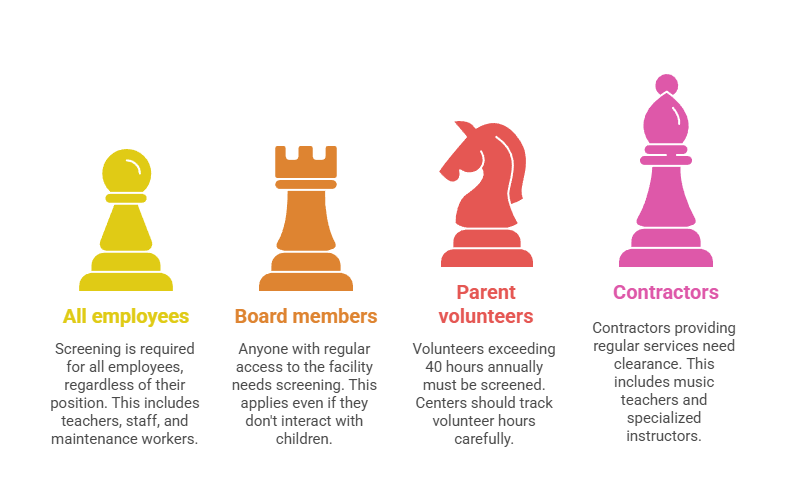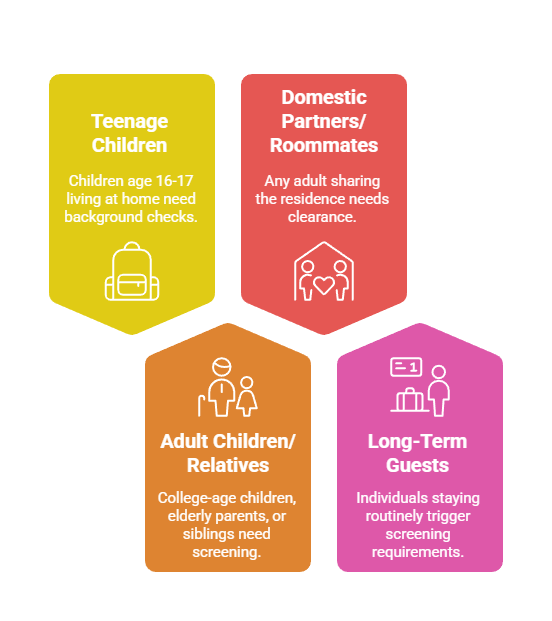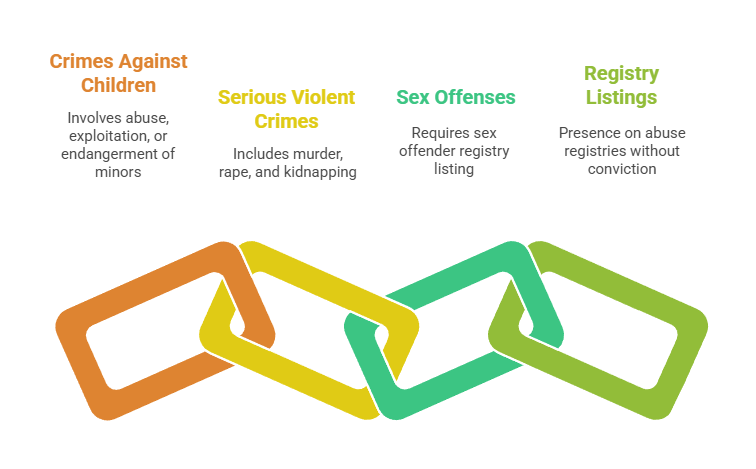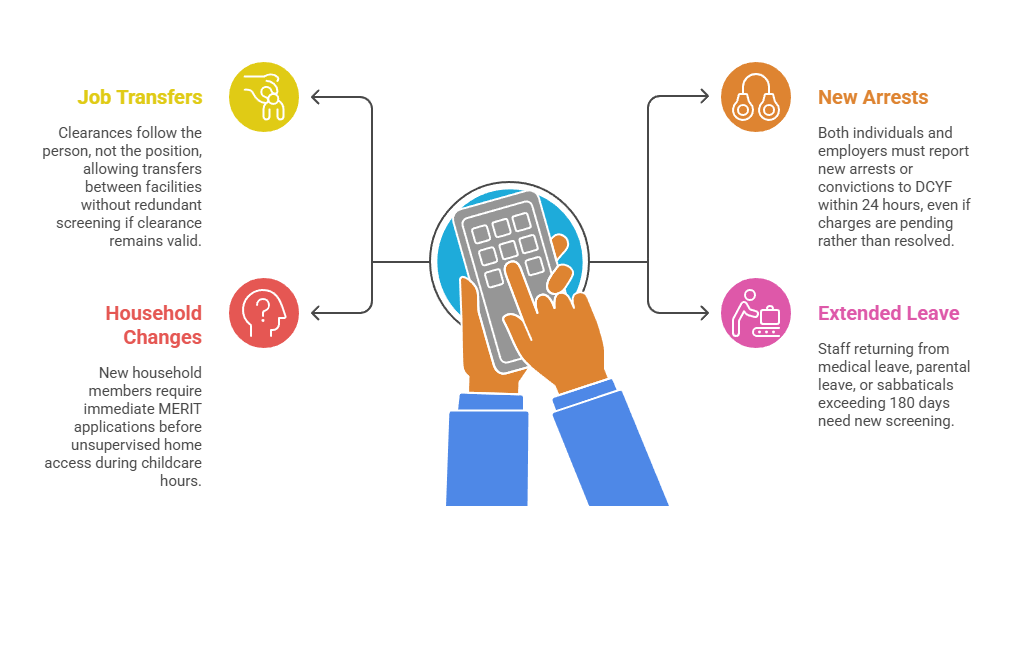Washington's daycare background check process through the MERIT system requires fingerprint-based FBI and state criminal history checks processed by the Background Check Central Unit (BCCU), with specific requirements varying by provider type and role classification under DCYF regulations. This comprehensive guide walks childcare administrators through the complete Washington State Patrol (WSP) and FBI background check process, covering DCYF background check requirements, MERIT system navigation, and compliance timelines to ensure your facility meets all Washington childcare licensing background check standards.
Key Takeaways
- Washington daycare background checks are mandatory for all staff, volunteers with unsupervised access, and household members in family childcare settings, processed exclusively through the MERIT system managed by DCYF.
- The Background Check Central Unit (BCCU) handles fingerprint processing for FBI and Washington State Patrol criminal history checks, with results typically returning within 2-4 weeks for routine applications.
- Licensed childcare centers must complete background checks before an employee's first day, while family home providers need clearance for all household members age 16 and older before licensure.
- MERIT system background check costs range from $66.75 to $84.75 depending on whether the application includes only state checks or combined FBI/WSP screening.
- King County daycare background requirements include additional Seattle-specific business licensing that may require supplementary local background verification beyond DCYF standards.
- Disqualifying convictions include specific crimes against children, violent felonies, and certain misdemeanors within designated timeframes, though some offenses qualify for the Character, Competence, and Suitability (CCS) waiver process.
- Background check clearances must be renewed every three years for continuing employees, with MERIT system notifications sent 90 days before expiration to maintain compliance.
- DSHS-licensed programs serving children with developmental disabilities face overlapping background check requirements that must satisfy both DCYF childcare standards and DSHS Residential Care Services regulations.
Understanding Washington's MERIT System for Daycare Background Checks
The MERIT (Monitoring, Evaluating and Reporting Information Technology) system serves as Washington State's centralized platform for processing all childcare background checks. DCYF (Department of Children, Youth, and Families) administers this digital infrastructure. The system replaced paper-based processes in 2018. Every staff member, volunteer, and relevant household member must navigate this streamlined yet complex system.
Unlike many states that allow providers to submit standard employment background checks, Washington requires all daycare-related screening to flow through BCCU fingerprint processing. This Washington State Patrol division exclusively handles childcare sector checks. The system ensures FBI criminal history records and state databases are properly queried. Multiple agencies coordinate through this framework: WSP processes fingerprints, FBI returns national criminal history, DCYF evaluates results against licensing standards, and DSHS maintains overlapping requirements for specialized programs.
The MERIT system integrates with multiple databases simultaneously. These include Washington's Child Abuse and Neglect (CAN) registry, sexual misconduct registries, and Department of Corrections records. A single MERIT application triggers approximately 15 separate database queries. This comprehensive screening explains why the process typically requires 2-4 weeks even for applicants with clean records.
What Makes Washington's Background Check System Unique
Washington's system differs from other states in three critical ways. First, all childcare background checks must flow through the state-controlled BCCU system rather than private screening companies. Second, the MERIT platform connects multiple state and federal databases in real-time. Third, the system applies broader screening requirements to household members in family childcare settings than most states mandate.
The multi-layered approach creates thorough protection but adds complexity. Administrators cannot expedite processing through private services. All applications follow the same government timeline. This uniformity ensures consistency but limits flexibility during urgent hiring situations.
Who Needs a DCYF Background Check
Washington childcare licensing background check requirements extend further than most administrators initially anticipate. The state categorizes individuals requiring screening into distinct groups based on facility type and role.
Licensed childcare centers must obtain clearance for these individuals:

- All employees regardless of position: This includes lead teachers, assistant teachers, kitchen staff, administrative personnel, maintenance workers, and anyone routinely present during operating hours.
- Board members and advisory council members: Anyone with regular facility access requires screening, even if they never directly interact with children.
- Parent volunteers exceeding 40 hours annually: Centers must track volunteer hours carefully to identify when screening becomes mandatory.
- Contractors providing regular services: Music teachers, specialized instructors, and vendors present during childcare hours without continuous staff supervision need clearance.
The determining factor is routine presence on premises during operating hours, not direct child interaction. A bookkeeper who visits weekly during naptime still requires full screening.
Family home childcare providers face broader requirements. All household members age 16 and older need clearance. This includes adult children, roommates, relatives, and anyone spending routine overnights or having unrestricted home access during childcare hours. DCYF interprets "household member" strictly—even college-age children who return home on weekends trigger the requirement.
The Complete DCYF Background Check Requirements for Different Provider Types
Washington structures background check requirements across three primary childcare categories. Each category follows distinct regulatory frameworks under Washington Administrative Code (WAC). Understanding your facility's classification determines which specific requirements apply.
Licensed Childcare Centers and Preschools
Centers licensed under DCYF regulations must complete Washington State Patrol and FBI background checks for every employee before their first day of work. WAC 110-300-0105 prohibits unsupervised child access for any individual lacking background check clearance. This creates operational challenges for administrators managing hiring timelines during high-turnover seasons.
The process requires three simultaneous components working together. First, the applicant submits a MERIT system application online. Second, they complete BCCU fingerprint processing at an approved location. Third, DCYF reviews results against disqualifying criteria. Centers cannot use "provisional" or "pending" employment arrangements—clearance must be final before the employee assumes duties.
Centers operating in King County face additional considerations. Some municipalities require business license applicants to submit supplementary local background checks. These local checks don't replace MERIT requirements but may affect licensing timelines. Seattle-metro providers should verify municipal requirements early in the application process.
Family Home Childcare Providers
Family childcare licensure extends background check requirements to the provider's entire household. Every individual age 16 or older residing in or regularly present at the home during childcare hours needs clearance through the same MERIT system background check process as the provider. This creates unique compliance challenges that differ significantly from center-based programs.
Household member definitions include more people than providers typically expect:

- Teenage children of the provider: Children age 16-17 living in the home require full background checks even if they attend school during childcare hours.
- Adult children and relatives: College-age children visiting on weekends, elderly parents, or siblings staying temporarily all need screening if present during operating hours.
- Domestic partners and roommates: Any adult sharing the residence requires clearance regardless of their relationship to the provider.
- Long-term guests: Individuals staying routinely (weekly or more frequently) trigger screening requirements even without formal residence.
DCYF licensors verify household composition during initial and renewal inspections. They compare utility bills, vehicle registrations, lease agreements, and other documentation against the provider's declared household roster. Undisclosed household members discovered during inspections result in immediate licensing violations and potential program closure.
School-Age Care and Certified Programs
Washington's tiered licensing system includes "certified" programs serving only school-age children in less intensive arrangements than full-day care. These programs follow modified background check requirements under WAC 110-305. The core MERIT system process remains identical, but employment timing rules differ slightly.
Certified programs may employ staff awaiting final FBI results under specific conditions. The employee must have clear WSP state background check results. They must maintain line-of-sight supervision by a fully cleared staff member at all times. This provisional employment option doesn't apply to licensed centers serving younger children.
Step-by-Step: Navigating the MERIT System and BCCU Fingerprint Process

Successfully completing a Washington daycare background check requires navigating a sequential process with specific timing requirements at each stage. Understanding the workflow prevents common delays that extend the typical 2-4 week processing timeline to 6-8 weeks or longer. Each step builds on the previous one, making accuracy essential from the start.
Creating Your MERIT Account and Submitting Applications
New applicants begin at the MERIT public portal (https://merit.dcyf.wa.gov) by creating individual accounts using a valid email address and Washington State identification. The system requires applicants to create their own accounts—employers cannot create accounts on behalf of employees. However, administrators can initiate the process by sending invitation emails through their facility's MERIT provider account.
After account creation, applicants complete the background check application form collecting detailed personal information. The system uses this data to query multiple databases, making accuracy critical. Applicants must provide their full legal name (including any maiden names or aliases), date of birth, Social Security number, current address, and all addresses for the past five years. Employment history for the previous five years is also required.
The application includes questions about criminal history, pending charges, and restraining orders. Answering "yes" doesn't automatically disqualify an applicant but triggers additional review. False statements constitute grounds for permanent disqualification even if the underlying offense would have been waivable. Upon submission, applicants pay fees through the MERIT portal using a credit or debit card and receive a fingerprint services authorization form.
Completing Fingerprint Services at Approved Locations
BCCU fingerprint processing occurs exclusively at Washington State Patrol-approved sites. These include many law enforcement agencies, private fingerprinting services, and dedicated BCCU service centers. Not all locations accepting fingerprints for other purposes can process DCYF background checks—applicants must verify BCCU approval before scheduling appointments.
King County offers multiple BCCU-approved locations including the WSP Seattle office, several police departments, and private vendors. Rural providers may face limited options, with some areas served by a single approved location within 50 miles. The MERIT portal provides an updated list of approved sites with contact information and appointment requirements.
Applicants bring their MERIT-generated authorization form, photo identification, and payment for location-specific fees (typically $10-25 separate from MERIT system fees). The fingerprint technician captures electronic prints transmitted directly to BCCU. Some locations still use ink cards for applicants with difficult-to-scan fingerprints due to manual labor, aging, or scarring. Poor-quality fingerprints cause the most common processing delays and require complete resubmission, adding 2-3 weeks to the timeline.
Understanding Processing Timelines and Status Tracking
After fingerprint submission, BCCU processes the application through Washington State Patrol databases and forwards prints to the FBI for national criminal history checks. Processing occurs in stages with different timeframes. The WSP background check typically completes within 3-5 business days. FBI results take 1-3 weeks depending on current processing volumes and whether manual review is required.
MERIT system notifications arrive via email when status changes occur. Updates include when BCCU receives fingerprints, when WSP completes state checks, when FBI results arrive, and when DCYF completes final review. Applicants and employers can track progress through their MERIT dashboards, though status updates sometimes lag 24-48 hours behind actual processing stages.
If criminal history appears, DCYF reviews the records against disqualifying criteria and may request additional documentation. Required documents might include court records, completion certificates for ordered programs, or character references. This review extends processing to 4-6 weeks, and applicants must respond to documentation requests within specified timeframes or face denial for non-cooperation.
DCYF Background Check Costs and Fee Structures
Understanding the complete financial investment in Washington childcare licensing background checks helps administrators budget appropriately. Costs include both state fees and location-specific charges. Family providers operating household-based programs face particularly significant expenses when multiple household members require screening.
| Fee Component | Cost Range | Paid To |
| MERIT Application (FBI + WSP) | $66.75 | DCYF via MERIT Portal |
| State-Only Renewal (if eligible) | $43.75 | DCYF via MERIT Portal |
| Fingerprint Service Fee | $10-30 | Individual Fingerprint Location |
Most childcare positions require the full FBI background check costing $66.75 through the MERIT portal. This fee covers DCYF's administrative processing, WSP state database queries, and FBI fingerprint comparison and records check. Washington residents who completed an FBI background check through MERIT within the past two years may qualify for state-only renewals at reduced cost, though this applies primarily to individuals transferring between childcare positions.
Separate from MERIT fees, fingerprint service locations charge for capture and transmission services. Law enforcement agencies often charge less than private fingerprinting services. Applicants whose fingerprints require resubmission due to quality issues pay the fingerprint service fee again but not the full MERIT application fee.
Who Pays: Employer vs. Employee Obligations
Washington law doesn't mandate whether employers or employees pay background check costs. Fee responsibility depends on facility policies and employment agreements. Most licensed centers cover background check costs as a business expense, treating screening as a prerequisite to employment similar to training or uniforms.
Some facilities implement hybrid approaches to manage costs. They might pay for initial background checks but require employees to cover renewal costs if they remain employed beyond the three-year clearance period. Other centers pay initial screening but deduct costs from final paychecks if employees leave within 90 days. This approach views premature departure as failing to provide sufficient service value to justify the investment.
Family home providers typically pay background check costs for household members since these individuals aren't employees but licensing nonetheless mandates their clearance. The financial burden surprises many new family providers—a household of four adults means $267 in MERIT fees plus fingerprint service charges before the provider can even apply for licensure. Job seekers should clarify background check fee responsibility during the interview process since policies vary widely between employers.
Disqualifying Offenses and the Character, Competence, and Suitability Review
Not all criminal history automatically bars childcare employment in Washington. DCYF maintains specific disqualifying offense lists while offering waiver processes for certain convictions. This creates a nuanced evaluation framework that considers offense nature, timeframes, and rehabilitation evidence. Understanding these categories helps administrators and applicants navigate the system more effectively.
Permanent vs. Time-Limited Disqualifications
Washington law establishes two distinct categories of disqualifying offenses. Permanent disqualifiers bar childcare involvement regardless of how long ago the conviction occurred or what rehabilitation the individual has achieved. Time-limited disqualifications bar applicants for specified periods after conviction or completion of sentence terms.
Permanent disqualifications with no waiver possibility include:

- Crimes against children: Sexual abuse, physical abuse, exploitation, abandonment, and endangerment of minors.
- Serious violent crimes: Murder, manslaughter, rape, sexual assault, kidnapping, and arson.
- Sex offenses: Any crime requiring sex offender registry listing, including attempted offenses.
- Registry listings: Presence on child abuse and neglect (CAN) registries or vulnerable adult abuse registries creates permanent bars even without criminal conviction.
Time-limited disqualifications operate on specific timeframes measured from sentence completion, not conviction date. Violent felonies disqualify for 10 years. Serious drug offenses disqualify for 5 years. Certain misdemeanors involving domestic violence, theft, or fraud disqualify for 3 years. The disqualification period begins from the later of conviction date or sentence completion—including parole, probation, and restitution obligations.
Multiple convictions create additional complications. Three DUI convictions across 15 years might not individually disqualify but collectively could trigger denial based on demonstrated judgment concerns. DCYF evaluates patterns of behavior, not just isolated incidents.
The CCS Waiver Process
The Character, Competence, and Suitability (CCS) review process allows individuals with certain disqualifying convictions to request DCYF evaluation of their fitness for childcare employment. Only time-limited disqualifications qualify for CCS consideration—permanent disqualifiers never receive waivers. The process requires substantial documentation and extends processing timelines significantly.
| CCS Application Component | Requirements | Purpose |
| Court Records | Complete conviction details and sentencing documents | Verifies offense specifics and legal outcomes |
| Completion Certificates | Proof of finished programs (treatment, classes, community service) | Demonstrates compliance with court orders |
| Character References | Letters from employers, community members, or mentors | Provides third-party perspective on rehabilitation |
| Personal Statement | Detailed explanation of circumstances and rehabilitation | Shows accountability and behavior change |
| Employment History | Work record since conviction | Establishes post-conviction stability |
DCYF evaluates CCS requests against several factors when making determinations. These include time elapsed since the offense, evidence of rehabilitation and behavior change, the offense's relevance to childcare duties, and the applicant's candor during the background check process. An applicant who disclosed a conviction on the initial MERIT application and provided detailed explanation stands better chances than someone whose conviction surfaced through the background check despite application statements claiming no criminal history.
The CCS review process extends background check timelines by 4-8 weeks beyond standard processing. DCYF sometimes grants conditional clearances with restrictions—allowing employment but prohibiting unsupervised child access, requiring additional supervision beyond standard ratios, or limiting duties to administrative roles without direct care responsibilities. Employers should understand that they aren't obligated to hire someone with a CCS waiver since it removes DCYF's regulatory bar but doesn't compel employers to disregard their own hiring standards.
Maintaining Compliance: Renewals, Updates, and Ongoing Requirements
Background check clearance isn't a one-time milestone but an ongoing compliance obligation. Facilities must manage renewal cycles, change notifications, and documentation throughout employment. Proactive tracking systems prevent operational disruptions and licensing violations.
Three-Year Renewal Cycles
Washington daycare background checks remain valid for three years from the clearance issue date, not the hire date. The MERIT system sends renewal notifications 90 days before expiration to both the individual and the employer's DCYF provider account. Failing to complete renewals before the expiration date requires employees to stop working until new clearance is obtained, creating operational disruption and potential ratio violations.
The renewal process mirrors initial applications completely. Individuals must submit a new MERIT application, pay renewal fees, and complete fresh BCCU fingerprint processing. Some administrators mistakenly believe renewals involve simpler document updates rather than complete reprocessing. This misconception leads to insufficient timeline planning since renewal applications take 2-4 weeks just like initial checks.
Facilities should implement tracking systems to monitor clearance expiration dates for all staff. Set internal alerts 120 days before expiration to allow buffer time for processing delays. High-turnover environments managing dozens of staff members across different hire dates need robust systems—spreadsheet trackers, MERIT dashboard reviews, or specialized compliance software all work effectively.
When Background Checks Must Be Updated
Beyond scheduled renewals, certain situations trigger immediate re-screening requirements. Understanding these triggers prevents compliance gaps. When employees leave childcare employment for more than 180 consecutive days, they must complete new background checks before returning to the field, even if their previous clearance hasn't expired. The six-month employment gap suggests potential intervening criminal activity not captured by original screening.
Additional update requirements include:

- Job transfers within continuous employment: Clearances follow the person, not the position, allowing transfers between facilities without redundant screening if clearance remains valid.
- New arrests or convictions during clearance period: Both individuals and employers must report these to DCYF within 24 hours, even if charges are pending rather than resolved.
- Family childcare household composition changes: New household members require immediate MERIT applications before unsupervised home access during childcare hours.
- Extended leave returns: Staff returning from medical leave, parental leave, or sabbaticals exceeding 180 days need new screening.
DCYF evaluates new criminal charges against disqualifying criteria and may suspend clearance pending case resolution. Changes to family childcare household composition require immediate action—when a provider's adult child returns home after college, a new romantic partner moves in, or a relative comes to stay long-term, the provider must initiate MERIT applications immediately. DCYF interprets this strictly, viewing even a single day of presence without initiated background checks as a licensing violation.
Navigating Special Situations and Complex Scenarios
Standard background check processes don't address every scenario childcare administrators encounter. Several special situations require modified approaches or additional screening components beyond the basic MERIT system workflow. Understanding these nuances prevents delays and ensures complete compliance.
DSHS-Licensed Programs and Dual Requirements
Childcare programs licensed by the Department of Social and Health Services (DSHS) rather than DCYF face overlapping background check requirements. These programs primarily serve children with developmental disabilities in residential settings. They must satisfy both DCYF childcare standards and DSHS Residential Care Services regulations, which maintain separate background check criteria and processing systems.
DSHS background checks follow similar fingerprint-based FBI and WSP procedures but flow through different agency channels. The requirements diverge in evaluation criteria—DSHS maintains different disqualifying offense lists, uses separate waiver processes, and applies distinct timeframes for time-limited disqualifications. A conviction that receives a DCYF CCS waiver won't automatically satisfy DSHS standards, requiring separate waiver applications through different agencies with independent review processes.
Programs serving this population typically complete both screening processes simultaneously. They submit parallel applications through DCYF's MERIT system and DSHS background check systems. The dual approach costs additional fees and extends processing timelines to 6-8 weeks as each agency independently evaluates results against its criteria.
Out-of-State Applicants and International Background Considerations
Washington's background check system includes national FBI databases capturing criminal history from all states. However, applicants who recently moved to Washington face additional scrutiny. DCYF sometimes requires supplementary state-specific background checks from states where the applicant resided in the past five years. This occurs particularly when FBI results show gaps or when applicants lived in states with limited database participation in national systems.
These supplementary checks require applicants to contact previous states' background check agencies directly. They must request criminal history reports and submit results to DCYF through the MERIT portal. Processing timelines vary dramatically by state—some provide results within days, while others take 6-8 weeks and require notarized request forms, fingerprint cards mailed to state capitals, and certified payment methods. Out-of-state applicants should disclose their residence history completely on MERIT applications and proactively request previous-state background checks simultaneously with Washington processing.
International applicants who live abroad present unique challenges that require individualized solutions. FBI databases won't capture criminal history from other countries, and DCYF cannot mandate foreign government background checks beyond U.S. legal jurisdiction. DCYF handles these cases individually, sometimes requiring applicants to provide police clearance letters from previous countries of residence, international criminal history checks through Interpol channels, or sworn affidavits attesting to the absence of foreign convictions. These requirements vary based on how long the applicant lived abroad and how recently they returned to the United States.
Conclusion
Navigating Washington's daycare background check requirements through the MERIT system demands attention to provider-specific requirements, processing timelines, and ongoing compliance obligations. Whether you're administering a licensed childcare center in King County, operating a family home program, or managing a school-age care facility, understanding DCYF background check requirements and BCCU fingerprint processing workflows ensures your facility maintains regulatory compliance while building safe environments for children. Start background checks early—ideally 6-8 weeks before needed start dates—to accommodate processing delays, and implement robust tracking systems to monitor three-year renewal cycles for all staff and household members. By treating Washington childcare licensing background checks as an ongoing compliance program rather than a one-time hurdle, administrators transform regulatory requirements into operational routines that protect children while supporting smooth hiring and retention processes.
Frequently Asked Questions
How long does a Washington daycare background check take?
Standard processing through the MERIT system and BCCU fingerprint processing takes 2-4 weeks from fingerprint submission to final clearance. This assumes clear results with no criminal history requiring review. Applications with criminal records, CCS waiver requests, or fingerprint quality issues requiring resubmission may extend to 6-8 weeks or longer.
Can I start working at a daycare while my background check is pending?
No, Washington law prohibits childcare facility employees from having unsupervised access to children before final background check clearance is issued. Licensed centers cannot use provisional or pending employment arrangements. School-age certified programs may allow supervised work after WSP state results are clear while awaiting FBI results, but the employee must maintain continuous line-of-sight supervision by fully cleared staff.
What disqualifies you from working at a daycare in Washington?
Permanent disqualifiers include convictions for crimes against children, murder, rape, kidnapping, arson, child pornography, and listings on sex offender or child abuse registries. Time-limited disqualifications include violent felonies (10 years), serious drug offenses (5 years), and certain misdemeanors like domestic violence or theft (3 years from sentence completion). Multiple convictions may create disqualification based on behavior patterns even if individual offenses fall outside specified timeframes.
How much does a Washington childcare background check cost?
The MERIT system background check costs $66.75 for combined FBI and WSP screening, paid through the application portal. Fingerprint service locations charge an additional $10-30 for capture and transmission services. Family home providers pay these fees for each household member age 16 and older, while licensed center employers typically cover costs for staff.
Do volunteers at daycares need background checks in Washington?
Volunteers require DCYF background checks only when they have unsupervised access to children. Volunteers who participate in activities under continuous direct supervision by cleared staff members—such as occasional field trips or special events—generally don't need screening. Many facilities adopt universal volunteer background check policies as best practice regardless of supervision arrangements.
How do I check my Washington daycare background check status?
Log into your MERIT account at merit.dcyf.wa.gov to view application status. The dashboard updates as BCCU receives fingerprints, WSP completes state checks, FBI returns results, and DCYF completes final review. The system sends email notifications at each processing stage, though dashboard status may lag 24-48 hours behind actual progress.
What is the Character, Competence and Suitability waiver process?
The CCS process allows individuals with time-limited disqualifying convictions to request DCYF evaluation of their fitness for childcare employment. The review requires court documentation, completion certificates from ordered programs, character references, and a personal statement demonstrating rehabilitation. Processing extends timelines by 4-8 weeks with no approval guarantee, and only time-limited disqualifications qualify for consideration.
Do daycare background checks in Washington expire?
Yes, background check clearances remain valid for three years from the issue date. The MERIT system sends renewal notifications 90 days before expiration. Employees must complete new applications with fresh fingerprinting before clearance expires to avoid work interruption, following the same process as initial applications with 2-4 week processing timelines.
Additional Resources
- Washington DCYF MERIT System - Official Background Check Portal
https://www.dcyf.wa.gov/services/background-checks/merit - Background Check Central Unit (BCCU) - WSP Fingerprinting Services
https://www.wsp.wa.gov/services/background-checks/ - WAC 110-300-0105 - Licensed Childcare Center Background Check Requirements
https://apps.leg.wa.gov/wac/default.aspx?cite=110-300-0105 - WAC 110-300A - Family Home Child Care Licensing Requirements
https://apps.leg.wa.gov/wac/default.aspx?cite=110-300A - DCYF Character, Competence and Suitability (CCS) Review Process
https://www.dcyf.wa.gov/services/background-checks/ccs-review
Still have questions?
Get in touch with our team today for a personalized demo and discover how our tailored volume pricing and packages can drive results for your business!
How useful was this page?*
Note: your comments are anonymous. We use them to improve the website. Do not include any personal details.
Visit our FCRA Compliance Tool or leave a message here if you need a response.
From the blog Explore the GCheck Content Hub

Healthcare Background Check Requirements by State: A 2026 Operational Guide
14 Jan, 2026 • 18 min read
DUI Employment Restrictions by Industry: Complete 2026 Guide
14 Jan, 2026 • 19 min read
Financial Sector Background Checks: Navigating the 2026 Screening Landscape
13 Jan, 2026 • 18 min readThe information provided in this article is for general informational and educational purposes only and should not be construed as legal advice or a substitute for consultation with qualified legal counsel. While we strive to ensure accuracy, employment screening laws and regulations—including but not limited to the Fair Credit Reporting Act (FCRA), Equal Employment Opportunity Commission (EEOC) guidelines, state and local ban-the-box laws, industry-specific requirements, and other applicable federal, state, and local statutes—are subject to frequent changes, varying interpretations, and jurisdiction-specific applications that may affect their implementation in your organization. Employers and screening decision-makers are solely responsible for ensuring their background check policies, procedures, and practices comply with all applicable laws and regulations relevant to their specific industry, location, and circumstances. We strongly recommend consulting with qualified employment law attorneys and compliance professionals before making hiring, tenant screening, or other decisions based on background check information.

